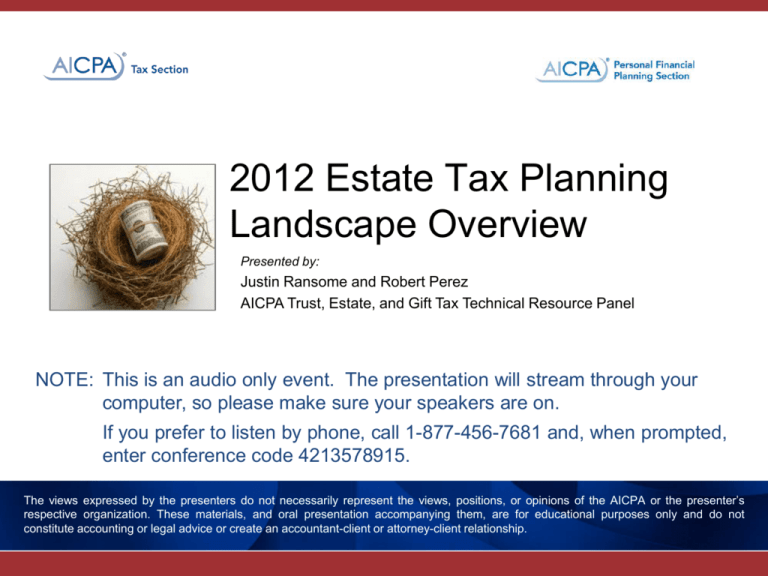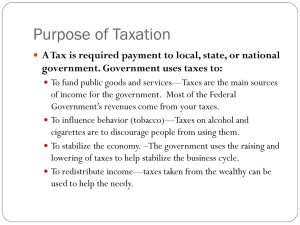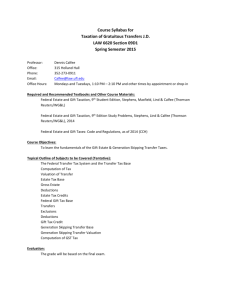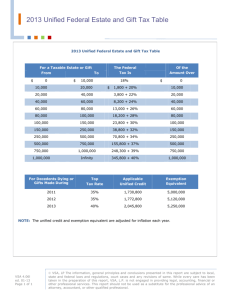Estate Planning Landscape Overview
advertisement

2012 Estate Tax Planning Landscape Overview Presented by: Justin Ransome and Robert Perez AICPA Trust, Estate, and Gift Tax Technical Resource Panel NOTE: This is an audio only event. The presentation will stream through your computer, so please make sure your speakers are on. If you prefer to listen by phone, call 1-877-456-7681 and, when prompted, enter conference code 4213578915. The views expressed by the presenters do not necessarily represent the views, positions, or opinions of the AICPA or the presenter’s respective organization. These materials, and oral presentation accompanying them, are for educational purposes only and do not constitute accounting or legal advice or create an accountant-client or attorney-client relationship. Navigating the webinar platform: To contact support, click here: For a copy of the presentation, click the Handouts button to open a window with a downloadable PDF : Tax Section Personal Financial Planning Section 2 Submitting questions during the presentation: Click the Q&A button in the toolbar below: Click then type your question in the box and click ‘submit’. If possible, we will answer questions as we go. We have also built in some time for additional questions at the end of the presentation. Tax Section Personal Financial Planning Section 3 Speakers' Biographies Robert Perez • Principal Shareholder • Robert Perez LLC • AICPA Trust, Estate, and Gift Tax Technical Resource Panel Member Justin Ransome • Partner, Washington National Tax Office • Grant Thornton LLP • AICPA Trust, Estate, and Gift Tax Technical Resource Panel Past Chair Tax Section Personal Financial Planning Section 4 Agenda Transfer Taxes in 2012 Transfer Tax Planning Techniques Planning Considerations in 2012 Tax Section Personal Financial Planning Section 5 Gift and Estate Tax – rates and exemption Gift and estate tax are re-unified Top marginal gift and estate tax rate is 35 percent Amount exempt from gift and estate tax is $5 million • Portable between spouses • Indexed for inflation beginning in 2012 (5.12 million) Tax Section Personal Financial Planning Section 6 Gift and Estate Tax – portability Applicable exclusion amount is sum of "basic exclusion amount" and "deceased spousal unused exclusion amount" (DSUEA) Basic exclusion amount is $5 million, indexed for inflation beginning in 2012 ($5.12 million) DSUEA is lesser of • Basic exclusion amount or • Excess of - Basic exclusion amount of last deceased spouse over - Amount with respect to which tentative estate tax is determined on estate of that spouse Tax Section Personal Financial Planning Section 7 Gift and Estate Tax – portability Susan and John are married and live in a noncommunity property state. Susan has assets of $2 million in her name, and John has assets of $7 million in his name. They have no joint assets and neither has made any taxable gifts. Susan dies in 2011 and leaves her assets to their children. John's DSUEA is $3 million – the lesser of: 1. Basic exclusion amount with regard to Susan of $5 million or 2. The excess of $5 million over sum of Susan's taxable estate of $2 million and adjusted taxable gifts of zero If John dies in 2012, applicable exclusion amount is $8 million Tax Section Personal Financial Planning Section 8 Gift and Estate Tax – portability Advantage of portability is it eliminates necessity to try to equalize estates of two spouses If poorer spouse dies first, that spouse's unused exclusion amount is not wasted As tempting as it may be to avoid effort to equalize, it is still a necessity until portability becomes permanent As of now portability applies only if first spouse dies after January 1, 2011 and surviving spouse makes gifts or dies before December 31, 2012 Portability does not apply for GSTT purposes Tax Section Personal Financial Planning Section 9 Gift and Estate Tax – clawback If 2010 Act sunsets and estate tax reverts to maximum rate of 55 percent and exemption amount of $1 million, question arises whether taxpayer who made gifts in 2011 and 2012 lose benefit of $5 million exclusion amount upon death Question revolves around what credit amount is to be used in computing gift tax payable • Under 2010 Act, it is amount as of date of death • Under prior law, it is as of date of gift • After 2001 Act sunsets, Code is to be administered as if 2001 Act "had never been enacted" • Thus, credit was never more than $345,800 Tax Section Personal Financial Planning Section 10 Generation-Skipping Transfer Tax Tax rate is 35 percent GST exemption is $5 million • GST exemption is indexed for inflation starting in 2012 ($5.12 million) • Not portable between spouses 2001 Act provisions preserved • • • • Automatic allocations to indirect skips 9100 relief for missed allocations and elections Retroactive allocations for unnatural orders of death Trust severances for GST tax purposes Tax Section Personal Financial Planning Section 11 Transfer Tax Status 2009-2013 Estate, Gift and GST Tax Rates and Exemptions Estate Tax Gift Tax Generation-Skipping Transfer Tax Exemption Top Rate Exemption Top Rate Exemption Top Rate 2009 $3,500,000 45% $1,000,000 45% $3,500,000 45% 2010 $5,000,000* 35%* $1,000,000 35% $5,000,000 0% 2011-12 $5,000,000** (portable) 35% $5,000,000** 35% $5,000,000** 35% 2013+ $1,000,000 55% $1,000,000 55% $1,000,000** 55% *May elect to apply law under EGTRRA (i.e., no estate tax in 2010, carryover basis) **Adjusted for inflation Tax Section Personal Financial Planning Section 12 Agenda Transfer Taxes in 2012 Transfer Tax Planning Techniques Planning Considerations in 2012 Tax Section Personal Financial Planning Section 13 Transfer Tax Planning Techniques Outright Gift Family Limited Partnership (FLP) Grantor Retained Annuity Trust (GRAT) Sales to Intentionally Defective Grantor Trust (Sale to IDGT) Tax Section Personal Financial Planning Section 14 Outright Gift – overview Individuals may give up to $13,000 annually without gift tax consequences In 2012, an individual may make taxable gifts of $5.12 million during life before incurring a gift tax liability Tax Section Personal Financial Planning Section 15 Outright Gift – advantages True freeze technique Removes income and appreciation on gifted property from estate Gifts are tax-exclusive (i.e., value of gift does not include value of tax) Tax Section Personal Financial Planning Section 16 Outright Gift – example Evan is divorced and has four children He has an estate worth $55 million in 2012 Evan gives each of his children assets worth $1.25 million Evan dies in 2021 Assume that amount excluded from estate tax returns to $1 million in 2020 and maximum estate tax rate is 55% Assume assets grow at 7% per year after tax Tax Section Personal Financial Planning Section 17 Outright Gift – example Gross Estate in 2021 Estate Tax Net Estate Gift in 2012 Total Estate Do Nothing $101,115,257 $55,267,591 $45,847,666 Gift $91,922,961 $50,916,829 $41,006,132 $9,192,296 $50,198,428 Benefit of Outright Gift $4,350,762 Tax Section Personal Financial Planning Section 18 FLP 1. Assets Senior Family Members 2. Limited & General Interests FLP 3. Limited Interest Junior Family Members Tax Section Personal Financial Planning Section 19 FLP – overview Partnership created to facilitate transfer of wealth from one generation to next generation Transfer tax benefit of creating FLP is reduction in gift/estate tax value of assets transferred to FLP when such assets are ultimately transferred to younger generations Reduction in value is result of discounts associated with transfer of limited interests in FLP Applicable discounts include minority interest, lack of marketability and/or lack of control High IRS scrutiny Tax Section Personal Financial Planning Section 20 FLP – advantages Control over assets and distributions Simplifies gift-giving and management of estate Investment flexibility and efficiency Asset protection Valuation discounts Tax Section Personal Financial Planning Section 21 FLP – example Evan is divorced and has four children He has an estate worth $55 million in 2012 Evan transfers $8 million of assets to a family LLC and gives each of his children a $1.25 million interest in LLC valued based on 37.5% discounts Evan dies in 2021 Assume that amount excluded from estate tax returns to $1 million in 2021 and maximum estate tax rate is 55% Assume assets grow at 7% per year after tax Tax Section Personal Financial Planning Section 22 FLP – example Gross Estate in 2021 Estate Tax Net Estate Gift in 2012 (no discount) Total Estate $53,231,886 Do Nothing $101,115,257 $55,267,591 $45,847,666 Gift of LLC $86,407,583 $47,883,371 $38,524,212 $14,707,674 Benefit of Gift of LLC $7,384,220 Tax Section Personal Financial Planning Section 23 GRAT 1. Property Parents 2. Income Interest GRAT 3. Remainder Interest Children Tax Section Personal Financial Planning Section 24 GRAT – overview Estate freeze technique used to transfer appreciation of assets in excess of section 7520 rate to younger generations Value of retained interest reduces value of transfer to GRAT for gift tax purposes Value of retained interest may be set equal to value of assets transferred to GRAT ("zero out") and, thus, there would be no gift tax consequences of transfer to GRAT Tax Section Personal Financial Planning Section 25 GRAT – advantages To extent assets transferred to GRAT appreciate at a rate in excess of section 7520 rate over annuity term, such “excess” appreciation inures to benefit of remainder beneficiaries free of additional transfer tax Because a GRAT is a “grantor trust” for income tax purposes, all income tax consequences associated with GRAT are responsibility of grantor, therefore preserving assets in GRAT that will ultimately pass to remainder beneficiaries Tax Section Personal Financial Planning Section 26 GRAT – interest rates Section 7520 rate (120% of mid-term applicable federal rate) for month in which transfer is made to GRAT is “hurdle rate” which assets have to beat in order for GRAT to produce an estate tax benefit As interest rates rise, all other factors remaining same, benefit of GRAT decreases $55M transfer, 5M gift, 9 year annuity term, 7% appreciation Rate 1.2% 2.4% 4.8% Tax Section Amount Removed from Estate $30,514,709 $26,333,439 $17,605,401 Personal Financial Planning Section 27 GRAT – example Evan is divorced and has four children He has an estate worth $55 million in 2012 Evan transfers all his assets to a family LLC Evan transfers his entire interest in LLC to a GRAT with a term of 9 years and a $5,000,000 present value remainder interest (based on a 37.5% discount and section 7520 rate of 1.2% (for July 2012)) which will be distributed to his children upon termination of annuity interest – Evan will receive an annuity of $3,462,852 ($5,540,653 undiscounted) per year Evan dies in 2021 Assume that amount excluded from estate tax returns to $1 million in 2021 and maximum estate tax rate is 55% Assume assets grow at 7% per year after tax Tax Section Personal Financial Planning Section 28 GRAT – example Gross Estate in 2021 Estate Tax Net Estate $29,504,934 GRAT in 2012 Total Estate Benefit of GRAT Tax Section Do Nothing $101,115,257 $55,267,591 $45,847,666 GRAT $66,364,743 $36,859,809 $34,750,514 $64,255,448 $18,407,782 Personal Financial Planning Section 29 Sale to IDGT 1. Gift “Seed” Property 2. Assets Parents 3. Note 4. Interest Payments IDGT 5. Remainder Interest Children/ Grandchildren Tax Section Personal Financial Planning Section 30 Sale to IDGT – overview Estate freeze technique that involves sale of assets to an “intentionally defective grantor trust” for an installment note Installment note generally set for a term of 5 to 9 years and interest rate set at section 7872 rate commensurate with term of installment note Because IDGT is a disregarded entity for income tax purposes, sale does not trigger income tax consequences Tax Section Personal Financial Planning Section 31 Sale to IDGT – advantages Removes appreciation in excess of section 7872 rate from grantor’s estate without additional transfer tax consequences Greater wealth transfer benefit if property sold to IDGT is discounted property and distributions from discounted property can service installment note Excellent vehicle to transfer wealth to grandchildren and younger generations Tax Section Personal Financial Planning Section 32 Sale to IDGT – interest rates Applicable federal rate for month in which sale takes place (commensurate with term of note) is “hurdle rate” which assets have to beat in order for Sale to IDGT to produce an estate tax benefit As interest rates rise, all other factors remaining same, benefit of Sale to IDGT decreases $5M gift, $50M sale, 9 year note, 7% appreciation Rate Amount Removed from Estate 2%$39,137,268 4%$27,159,279 6%$15,181,290 Tax Section Personal Financial Planning Section 33 Sale to IDGT – example Evan is divorced and has four children He has an estate worth $55 million in 2012 Evan transfers all his assets to a family LLC and gives a $1.25 million interest in LLC valued based on 37.5% discounts to a trust for benefit of each of his children Evan sells remaining LLC interests to children’s trusts for a $29,375,000 9 year balloon note with interest at 0.92% (July 2012 mid-term AFR) per year Evan dies in 2021 Assume that amount excluded from estate tax returns to $1 million in 2021 and maximum estate tax rate is 55% Assume assets grow at 7% per year after tax Tax Section Personal Financial Planning Section 34 Sale to IDGT – example Gross Estate in 2021 Estate Tax Net Estate Gift and Sale in 2012 Total Estate Benefit of Sale to IDGT Tax Section Do Nothing $101,115,257 $55,267,591 $45,847,666 Gift and Sale $32,612,051 $18,295,828 $14,316,223 $68,503,206 $82,819,429 $36,971,763 Personal Financial Planning Section 35 GRAT/Sale to IDGT – comparison Sale to IDGT Statutorily sanctioned No Protection against revaluation No1 Create without taxable gift Maybe2 Protection if assets decline in value No Grandchildren as beneficiaries Yes Able to terminate early Yes4 Balloon payment Yes Income tax consequences if grantor Possible5 dies during note term Amount includible in estate if grantor Unpaid dies during term Principal GRAT Yes Yes Yes Yes3 No No No No FMV of Trust Advantage GRAT GRAT GRAT GRAT Sale Sale Sale GRAT Sale 1. May use valuation clause to negate gift tax effect of revaluation 2. If seed gift in excess of credit amount 3. Assuming GRAT is “zeroed-out” 4. Note should allow for prepayment 5. Questionable whether death triggers gain if note still outstanding Tax Section Personal Financial Planning Section 36 Comparison Outright Gift $91,922,961 $50,916,829 $41,006,132 $9,192,296 $50,198,428 Gift of LLC $86,407,583 $47,883,371 $38,524,212 $14,707,674 $53,231,886 GRAT $66,364,743 $36,859,809 $29,504,934 $34,750,514 $64,255,448 Sale to IDGT $32,612,051 $18,295,828 $14,316,223 $68,503,206 $82,819,429 $4,350,762 $7,384,220 $18,407,782 $36,971,763 Tax Section Personal Financial Planning Section 37 Agenda Transfer Taxes in 2012 Transfer Tax Planning Techniques Planning Considerations in 2012 Tax Section Personal Financial Planning Section 38 Planning Considerations for 2012 Large Gift Interests in Closely-Held Family Business Grantor Retained Annuity Trust Sales to Intentionally Defective Grantor Trust Generation-Skipping Transfer Tax Planning Tax Section Personal Financial Planning Section 39 Large Gift Amount exempt from gift tax jumped dramatically from $1 million to $5.12 million (for 2012) Increase may be only temporary – December 31, 2012 Gift tax rate is only 35 percent – may revert to maximum of 55 percent in 2013 Gifts during 2012 eliminate future appreciation in value of gifted property from transfer taxes Gift of $5 million in 2012 instead of in 2013 results in an instant gift tax savings of $2,045,000 ($2,111,000 if gift of $5.12 million) Tax Section Personal Financial Planning Section 40 Interests in Closely-held Family Business Increased gift tax applicable exclusion amount of $5.12 million can be further leveraged by gifts of interests in closely-held family businesses valued using these discounts Discounts for minority interests and lack of marketability • Legislative proposals to limit use of discounts for closely-held family businesses have not been enacted • Discounts continue to be viable estate planning tool Even if discounts are legislatively restricted in future, donor has eliminated value representing discounted value from transfer taxes Tax Section Personal Financial Planning Section 41 GRAT GRATs continue to be valid estate planning tool for • Wealthy individuals • Individuals who may again be subject to estate taxes in 2013 and beyond • Individuals who are subject to state estate taxes Current low AFR rates to value retained interest as well as low values for assets to be transferred to GRATs continue to make GRATs an important estate planning technique Legislative proposals to require a 10-year minimum term GRATs have not been enacted Tax Section Personal Financial Planning Section 42 Sale to IDGT Seed money for sales to IDGTs Traditionally IDGT required to have 10 percent equity • If funded with $1 million tax-free gift, $10 million of assets could be sold to IDGT • Now increase funding by another $4 million tax-free gift, an additional $40 million can be sold to IDGT when section 7872 rates are currently low – 0.92 percent mid-term rate for July 2012 Additional gift to existing transaction to allow IDGT to pay off note President has provision in 2012 budget to eliminate benefits of IDGTs Tax Section Personal Financial Planning Section 43 Generation-Skipping Transfer Tax Planning Utilize increased GST exemption of $5.12 million (for 2012) Create new trusts to which GST exemption may be allocated • If created in state with no rule against perpetuities, trust can last forever • Trust will always be exempt from GSTT Consider late allocation to trust that is non-exempt or partially exempt Remember that GST exemption is allocated to trust based on value of trust at date of late allocation Tax Section Personal Financial Planning Section 44 Thank You! You only have 5 1/2 months to act Tax Section Personal Financial Planning Section 45 Questions Tax Section Personal Financial Planning Section 46 Upcoming Events Next Tax Power Hour: Starting Off Right – Roadmap to starting a firm today • Thursday, July 19th from 1 – 2 pm (Free, no CPE available) Other Tax Section webinars • July 24th (2 pm) Nuts & Bolts of a Partnership’s §754 Election - Register today: 1.5 Hours CPE (Tax Section Members can attend Free/No CPE) • July 26th (1 pm) Tax Practice Quality Control - Register today: 1.0 Hour CPE (Tax Section Members can attend Free/No CPE) • August 14th (2 pm) Using E-Services in Your Tax Practice - Register today: 1.5 Hours CPE (Tax Section Members can attend Free/No CPE) http://tax.aicpa.org → CPE & Events Tax Section Personal Financial Planning Section 4747 Save the Date… Registration links coming soon for: Tax Related Identity Theft • August 7th at 1 pm (1.0 hour CPE) Small Business Retirement Plans • August 8th or 9th (1.0 hour CPE) Cancellation of Debt • August 15th at 1:00 pm (1.0 hour CPE) Visit the CPE & Events page for registration links. Tax Section Personal Financial Planning Section 48 How did you like today’s webinar? Please complete a quick evaluation and let us know! Click here to complete the evaluation. Tax Section Personal Financial Planning Section 49







